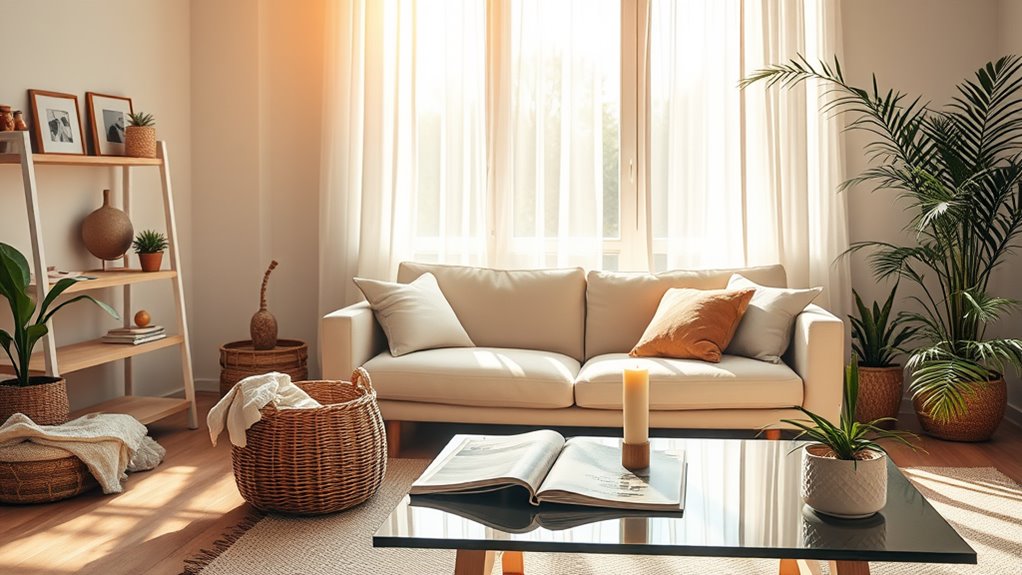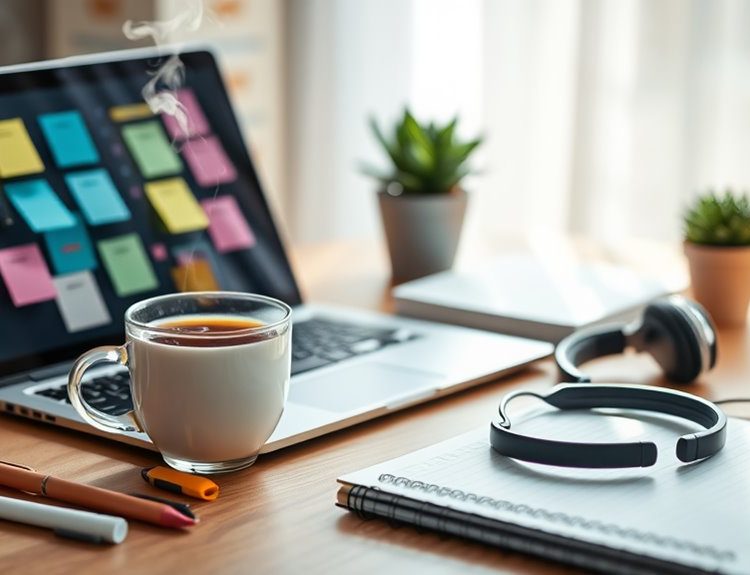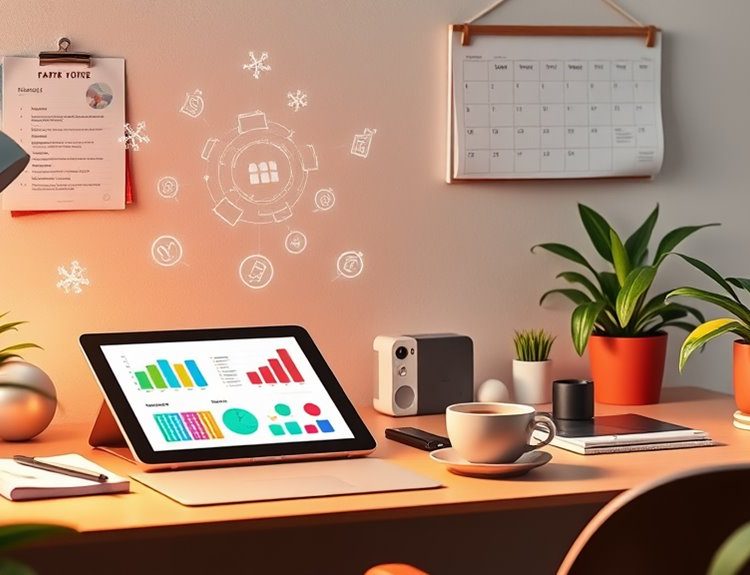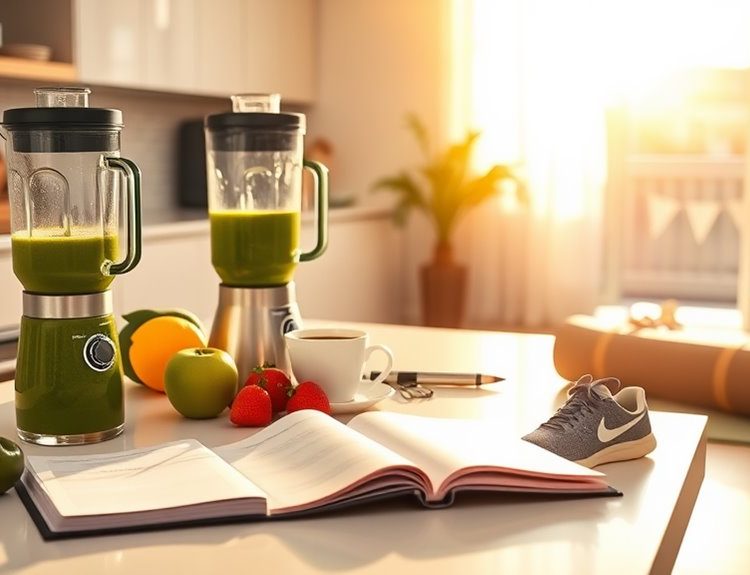Decluttering Hacks That Will Make You Love Your Home Again
If you want to fall in love with your home again, start with the 10-Minute Rule. Set a timer and tackle one small area at a time. Use a room-by-room approach, sorting items into keep, donate, or toss categories. Embrace a minimalist mindset by asking yourself if each item adds joy or serves a purpose. Implement smart storage solutions like under-bed boxes and vertical shelves to maximize space. Celebrate each decluttering win to keep your motivation high. These simple hacks can create a more peaceful environment, and there’s so much more you can explore to enhance your space further.
Key Takeaways
- Implement the 10-Minute Rule to tackle small areas, making decluttering less daunting and more manageable.
- Adopt a minimalist mindset by evaluating belongings for joy and functionality, prioritizing quality over quantity.
- Utilize smart storage solutions, like under-bed storage and vertical shelving, to maximize space and maintain organization.
- Sort items room-by-room into keep, donate, and toss categories to streamline the decluttering process and celebrate progress.
- Identify and address clutter patterns to understand their root causes, facilitating more effective management and prevention of future clutter.
Understand Your Clutter
Have you ever wondered why clutter accumulates in your space? Understanding the root of your clutter is the first step toward reclaiming your environment.
It often sneaks in through daily habits, like leaving items out after use or not having a designated spot for everything. You might find that emotional attachments to certain objects also contribute, making it hard to let go.
Look around and ask yourself why each item is there. Is it serving a purpose, or is it just taking up space? By analyzing your clutter, you can identify patterns and get to the heart of the issue.
Once you understand why clutter collects, you can take effective steps to manage and reduce it.
The 10-Minute Rule
The 10-Minute Rule is a simple yet effective strategy for tackling clutter without feeling overwhelmed.
Set a timer for just ten minutes and focus solely on one area of your home. It could be a countertop, a drawer, or a small section of your closet.
During those ten minutes, sort through items, toss what you don’t need, and organize what you want to keep. You’ll be amazed at how much progress you can make in such a short time.
Once the timer goes off, you can stop or keep going if you feel motivated. This approach makes decluttering manageable, turning it into a quick, rewarding task instead of an intimidating chore.
You’ll love the fresh feeling of your space!
Room-by-Room Approach
A room-by-room approach can streamline your decluttering process and make it less intimidating.
By focusing on one space at a time, you’ll feel a sense of accomplishment as each room transforms.
Here’s how to tackle it effectively:
-
Start with the easiest room: Pick a space that motivates you, like a bathroom or a closet.
-
Set a timer: Work in short bursts to keep your energy up—15 to 30 minutes works wonders.
-
Sort items: Use three boxes—keep, donate, and toss—to make decisions easier.
-
Celebrate small wins: After each room, take a moment to appreciate your progress.
This method not only simplifies the process but also helps you stay focused and motivated!
Minimalist Mindset Shift
Embracing a minimalist mindset can transform how you view your belongings and space. Instead of seeing items as just possessions, you’ll start to recognize their true value and purpose.
Ask yourself if each item genuinely adds joy or serves a function in your life. This perspective helps you let go of the clutter weighing you down. You’ll find that quality matters more than quantity; a few cherished items can bring more satisfaction than a room full of things you hardly use.
As you adopt this mindset, you’ll create a more intentional living space that reflects who you are. Ultimately, this shift empowers you to prioritize experiences over possessions, making your home feel more inviting and peaceful.
Smart Storage Solutions
When you think about maximizing your space, smart storage solutions can make a world of difference.
By utilizing clever organization methods, you can transform cluttered areas into serene spaces.
Here are four effective strategies to get you started:
-
Under-bed storage: Use bins or drawers to store seasonal clothes or shoes.
-
Vertical shelving: Install shelves to take advantage of wall space and keep items off the floor.
-
Multi-functional furniture: Opt for ottomans or coffee tables with hidden compartments.
-
Hooks and pegboards: Hang items like tools or kitchen utensils to free up drawer space.
Creative Decluttering Techniques
Five creative decluttering techniques can breathe new life into your space and make it feel more inviting.
Start by using the “one in, one out” rule. For every new item you bring home, let go of an old one.
Next, try the “30-day minimalism game.” Challenge yourself to remove one item on day one, two items on day two, and so on.
Third, create a designated donation box in your home; whenever you find something you no longer need, toss it in.
Fourth, repurpose items instead of discarding them—turn old jars into storage.
Finally, utilize artful displays; arrange your favorite items in a visually appealing way to enhance your decor while reducing clutter.
Enjoy the transformation!
Maintenance and Routine Tips
To maintain a clutter-free environment, it’s essential to establish a routine that fits seamlessly into your life.
Building habits will help keep your space organized and enjoyable. Here are some tips to get you started:
-
Daily Quick Clean: Spend 10 minutes each day tidying up high-traffic areas.
-
Weekly Declutter: Choose a specific day to tackle one area, like your kitchen or closet.
-
One In, One Out: Whenever you bring something new into your home, let go of something else.
-
Monthly Review: At the end of each month, assess your belongings and evaluate what you truly need.
Frequently Asked Questions
How Do I Decide What to Keep Versus What to Discard?
To decide what to keep versus what to discard, ask yourself if each item brings you joy or serves a purpose. If it doesn’t, let it go. Trust your instincts and create space for what matters.
Can Decluttering Improve My Mental Health?
Yes, decluttering can greatly improve your mental health. When you clear out unnecessary items, you create a more peaceful environment, reduce stress, and enhance focus, making it easier for you to feel organized and at ease.
What to Do With Sentimental Items?
When dealing with sentimental items, you can start by selecting a few favorites to keep. Consider taking photos of others to preserve memories while letting go. This way, you maintain emotional connections without the clutter.
How Often Should I Declutter My Home?
You should declutter your home at least seasonally, but if you feel overwhelmed, try monthly sessions. Regularly evaluating your space helps maintain order and guarantees you keep only what truly matters to you.
Is It Better to Declutter Alone or With Help?
Deciding whether to declutter alone or with help depends on your preference. If you’re motivated and organized, going solo might work. However, having a friend can keep you accountable and make the process more enjoyable.



